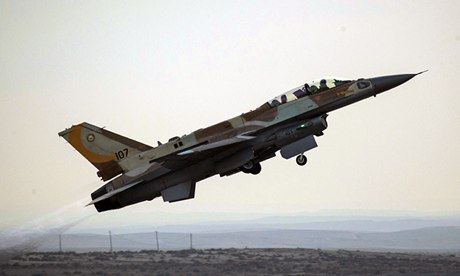Israeli warplanes have attacked a shipment of Russian missiles inside a Syrian government stronghold, according to US officials. The disclosure could further strain US-Israel relations, which are already under pressure over differences regarding the Iranian nuclear programme.
Neither the Israeli government nor its military made any comment on the US confirmation of an Israeli air strike on a missile base in the city of Latakia early on Thursday, but officials are privately furious at the White House statement.
"This raises very disturbing questions, and affects trust between allies," said one Israeli official. "Sharing information is embedded in the nature of the relationship between Israel and the US. It's like a big pipeline that's open to permanent flow. So disclosing information is a cause for dismay." He declined to comment on whether Israel was responsible for the air strike.
A US official told CNN that Israel targeted the base to prevent weapons being transferred to the Hezbollah militia, the Lebanese group backed by Syria and Iran. The Al-Arabiya network reported that stores of anti-aircraft missiles, which had been destined for Hezbollah, were destroyed in the attack.
Israel has repeatedly warned that it will take military action to stop the movement of advanced weapons. Several air strikes were carried out earlier this year, although Israel has not acknowledged its actions.
According to Israeli media reports, the US statement had caused "senior officials in Jerusalem to tear out their hair".
Alex Fishman, defence analyst for Israeli's biggest-selling daily Yedioth Ahronoth, wrote: "Past experience suggests that we shared information with them on our operational activity so as to prevent embarrassment and surprise, but Washington is selling our secrets on the cheap … This is now dangerous and contemptible behaviour committed deliberately by the administration, with the aim of sabotaging Israeli defence policy."
The revelation came as the government of President Bashar al-Assad met a key deadline in an ambitious plan to eliminate Syria's entire chemical weapons stockpile by mid-2014 and avoid international military action.
The announcement by a global chemical weapons watchdog that the country had completed the destruction of equipment used to produce the deadly agents highlights Assad's willingness to cooperate, and puts more pressure on the divided and outgunned rebels to attend a planned peace conference.
An Obama administration official confirmed the Israeli airstrike overnight, but provided no details. Another security official said the attack occurred late on Wednesday in the Syrian port city of Latakia and that the target was Russian-made SA-125 missiles.
There was no immediate confirmation from Syria.
Since the civil war in Syria began in March 2011, Israel has carefully avoided taking sides, but has struck shipments of missiles inside Syria at least twice this year.
The Syrian military, overstretched by the civil war, has not retaliated, and it was not clear whether the embattled Syrian leader would choose to take action this time. Assad may decide to let the Israeli attack slide again, particularly when his army has the upper hand on the battlefield inside Syria.
Israel has repeatedly declared a series of red lines that could trigger military intervention, including the delivery of "game-changing" weapons to the Syrian-backed Lebanese Hezbollah group.
Israel has never officially confirmed taking action inside Syria to avoid embarrassing Assad and sparking a potential response. But foreign officials say it has done so several times when Israeli intelligence determined that sophisticated missiles were on the move.
In January, an Israeli air strike in Syria destroyed a shipment of advanced anti-aircraft missiles bound for Hezbollah, according to US officials. And in May, it was said to have acted again, taking out a shipment of Iranian-made Fateh-110 missiles at a Damascus airport.
The Fateh-110s have advanced guidance systems that allow them to travel up to 200 miles with great precision. Their solid-fuel propellant allows them to be launched at short notice, making them hard to detect and neutralise.
Israel has identified several other weapons systems as game changers, including chemical weapons, Russian-made Yakhont missiles that can be fired from land and destroy ships at sea, and Russian SA-17 anti-aircraft missiles. Israel's January air strike is believed to have destroyed a shipment of SA-17s.
Syrian activists and opposition groups reported strong explosions on Wednesday night that appeared to come from inside an air defence facility in Latakia. They said the cause of the blasts was not known.
• This article was amended on 6 November 2013. The original picture caption called the jet an F-15I, when it is a picture of an F-16I fighter jet. The original article said Fateh-110 missiles "travel up to 200 miles per hour with great precision". This has been corrected to say up to 200 miles.
source: https://www.theguardian.com/world/2013/nov/01/us-israel-attack-syria-missiles
